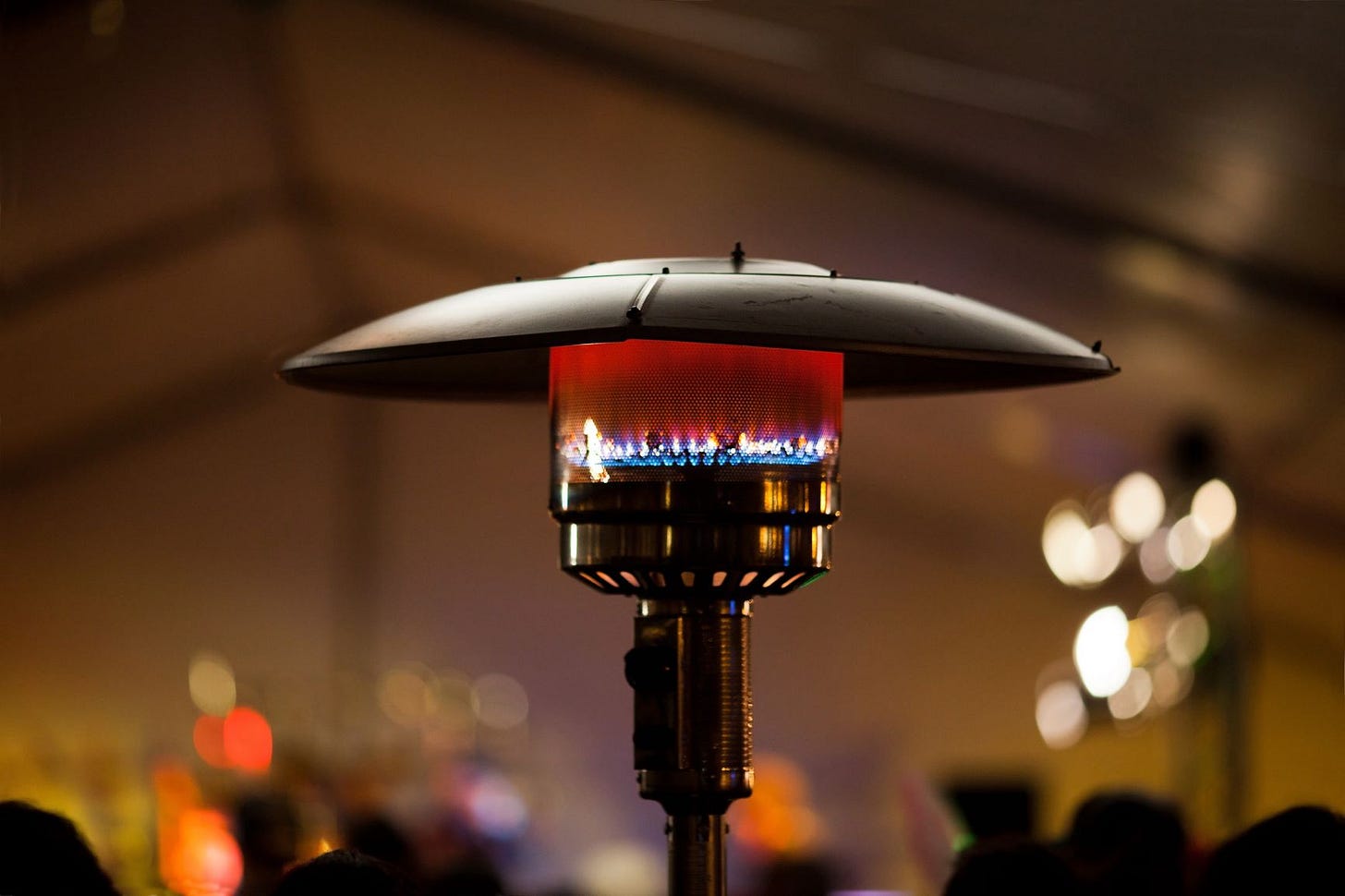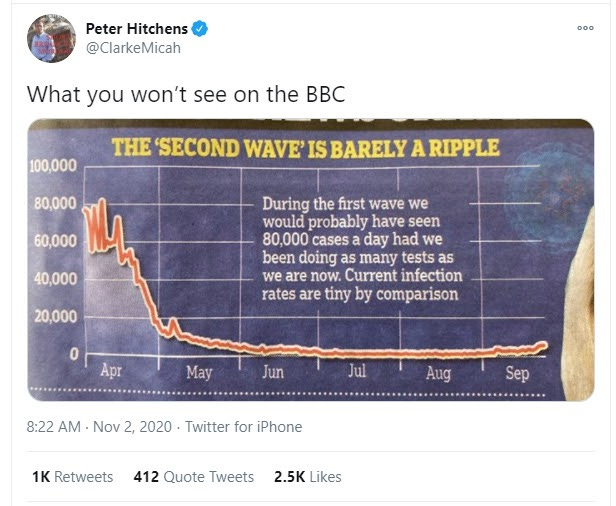Covid: The War We Never Fought
England* is about to go into a second lockdown, along with lots of other European countries. It’s possible that the second wave of Covid infections we’re experiencing was inevitable, but we didn’t really try to avoid it either.
First, remember that many people over the summer believed that Covid was done with, and undoubtedly influenced the government into a more permissive position via backbench Conservative MPs.
In June, Toby Young wrote:
I’m going to go out on a limb and predict there will be no “second spike” – not now, and not in the autumn either. The virus has melted into thin air. It’s time to get back to normal.
Then in September, Young wrote that “We know from experience what doesn’t happen next. The other novel coronaviruses this millennium have *not* produced second waves.”
Alistair Haimes, an investment manager who has written extensively on Covid from an anti-lockdown perspective, wrote in August that Covid deaths had fallen to zero in England, and that “it’s over”; then in September that there was “no second wave” after pubs and bars had been reopened (although cases had begun to rise by then).
Ivor Cummins, a low carb diet guru, recorded a widely shared video in September that argued that we had reached herd immunity already:
So around 80% are already de facto immune through cross-immunity, T-cells, prior coronaviruses. Around 1 in 5 people will be less immune, they're the ones it has to go through... Then the virus stumbles over immune people.
Sunetra Gupta, one of the leaders of the “Great Barrington Declaration” anti-lockdown movement, has repeatedly claimed since the beginning of the year that we may have reached herd immunity. In March, she and her team released a paper that suggested that more than half the UK’s population had already had Covid, which she has continued to defend since.
In May she gave an interview to Unherd claiming that “Covid is on the way out”:
I think that the epidemic has largely come and is on its way out in this country so I think [the Infection Fatality Rate] would be definitely less than 1 in 1000 and probably closer to 1 in 10,000. That would be somewhere between 0.1% and 0.01%.
By this point, 36,000 had died of Covid in the UK. If 100% of the UK’s population had had Covid by then, the UK would have had to have a population of 360 million people for her low-end IFR estimate to be right. (She did, after being challenged by the interviewer, then change this to 0.05%. This would mean a population of 120 million at a herd immunity level of 60%, which Gupta actually claims may be much higher than the true level.)
She continued to argue over the summer that we may already have herd immunity. In August, Karol Sikora, another Great Barrington leader, said that:
The gloom and doomsters are predicting another wave of it. Where’s that going to come from? I just don’t believe it. Epidemiologists love doom, because that’s what sells them. It doesn’t sell to say, you’re going to be OK.
And just today, Peter Hitchens tweeted a graph showing that there is actually no second wave. The only problem is that the graph is from September:
Some of these people are just cranks, but the government often acted as if it agreed with them. During the summer, it made a series of decisions that looked foolish at the time and now look absolutely catastrophic.
It allowed mass travel for summer holidays, and it seems very likely that travellers returning from Spain brought more Covid home with them. It subsidised people to go to restaurants, which a study this week suggested may have increased cases by 8-17%, based on comparisons of areas with rain during the scheme with similar areas without.
It reopened universities, and most universities have required indoor, in-person teaching, often in poorly ventilated rooms. It floated a “go back to the office or lose your job” campaign. It tried to wind down furlough, before extending it this week, meaning that many businesses have already laid off staff they could now be furloughing.
It also reopened schools, which I continue to believe was a serious error, although I think this is the most debatable, since young children missing a lot of school is probably costly to them. But it is likely that children spread the disease to a significant extent, according to multiple studies. Whether we should have reopened the schools depends on a few questions, but it is essential that people think of it as a trade-off - that the cost of kids missing a year of school was greater than the cost of a second lockdown, weighed by the role of schools in contributing towards that.
These were unforced errors. But just as bad were the things the government didn’t do. Most people focus on the lack of a working test and trace system, but it’s now obvious the UK lacks the sort of state effectiveness that would allow it to pull a project like that off in a short space of time. It’s annoying, but the UK is not alone in this.
But there were loads of things we could have done to slow down the rate of new infections that might have kept the rate of spread near or below one. A few weeks ago I tweeted some ideas for things we could have done to slow the spread of the virus. It’s too late for that now, but after this second lockdown ends, we may be ready to think more creatively to avoid a third one. Here are some things we can do:
Move to outdoor drinking and dining. We should turn over roads and parking spaces to pubs, cafes and restaurants by default. If you have a second lane or parking space outside your venue, the law assumes that you can use it for serving customers until further notice, as long as you keep it ventilated. Give over parks and other public spaces to restaurants and bars, and suspend normal rules on outside dining and drinking. More noise for neighbours is a bearable cost.
Grants for businesses moving outside and making indoors safer. You get very little reward as a business for improving your premises to be safer indoors, especially since shutdowns affect all businesses of a certain kind, not just risky ones. There should be matching grants and subsidies for any business that invests in better ventilation or other measures that reduce the rate of spread indoors. We could also consider allowing businesses to reopen according to measures of ventilation indoors there. Along with giving space to businesses outside, wcould subsidise outdoor heaters and tables to set these places up for the winter, instead of subsidising people to eat indoors in August. Still, at least we didn’t ban outdoor heaters like France did.
A public information campaign about how not to catch Covid. The biggest public health push so far this year was over hand-washing, but it now seems likely that the virus is spread via respiratory droplets and aerosols. Most people in the UK do not seem aware of this. Japan’s government has warned people about the Three C’s - Closed Spaces, Crowded Places and Close-Contact Settings - since the outbreak began, and this may have something to do with that country’s success in controlling the disease.
Proper enforcement of mask-wearing. The Tube is filled with people not bothering, or pulling theirs down to chat with other people, as have been a lot of shops. We should have made this a much bigger priority, with fines for businesses that did not enforce mask-wearing on their staff and customers, and with proper enforcement on public transport. The rule should be that if you can’t smoke in there, you’re breaking the law if you don’t wear a mask. And this would make a good public information ad campaign: "It's OK to politely tell someone to wear a mask."
Support for people self-isolating with sanctions for employers who don’t cooperate and free isolation for those who need it. Tens of thousands of hotel rooms around the country are empty right now.
Mandatory quarantining for international travellers entering the UK, except in exceptional circumstances, to take advantage of the fact that we are an island, and mandatory testing at the border for all travellers.
Home teaching “pods” for schoolchildren. One compromise between reopening the schools and keeping them closed could be to create miniature groups of kids who can learn in the same space together under adult supervision, either at a parent’s house or in an office that isn’t being used. This is obviously not as good as school, but it’s not as risky either, and means that entire classrooms don’t need to be shut down after one kid tests positive. This could also be a good way to employ recent graduates in a difficult labour market.
Perma-furlough until a vaccine is available. The purpose of furloughing was to keep businesses and their employees on life support for as long as necessary while the economy is facing the pandemic. Winding it down before the pandemic is over is pointless, and will probably exacerbate the spread of the disease (by forcing people back into work) and lead to unnecessary unemployment and bankruptcies.
A lot of this costs money. Fine. Borrowing is extremely cheap right now, and we can borrow on longer terms if we are worried about the cost of borrowing rising. The costs of further lockdowns, and of further avoidable deaths, are vastly higher. Of all the mistakes we can make right now, spending too much money is the lowest-risk one.
We’re going into a second lockdown without ever having tried to avoid it. The people who say they oppose lockdowns the most did the least to come up with ways of preventing us from needing another one. The government did virtually nothing until it was far too late, after a series of mistakes that made things worse, and it repeatedly failed to appreciate the costs and risks of its choices. Once this lockdown is over, we’ll have a choice again: whether we twiddle our thumbs while we wait for a third lockdown, or to think creatively about suppressing the virus until a vaccine arrives.
*This originally said the UK. Whoops.
Other things I’ve written recently
Why we should pay people to get vaccinated, with Ryan Bourne for The Times and CapX.
Why treating digital platforms as utilities is a bad idea, for The Hill.
I wrote for the Telegraph arguing that Covid is a collective action problem, so we can’t leave it to individuals to decide how to act. Unlike freedom of speech or the freedom to eat, my freedom to do what I want really does affect your freedom to do what you want.
Things I recommend you buy
Cillit Bang Black Mould Remover (£2). I detest cleaning the shower but this has made it very straightforward. Really, you just spray this on your tiles, let it sit for a few minutes, and wash away. It does an incredibly good job - the sort of thing you’d usually have to pay someone to achieve.
Felt desk mat (£10-14). This has been the best addition to my home office setup since lockdown began. It’s really inexpensive but makes my whole worktop feel much more premium and professional. It also encourages me to keep the area tidy, which helps me focus. An absolute bargain at the price and a must-have for a winter spent working from home.







